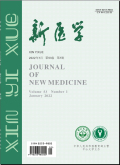新医学2024,Vol.55Issue(4):260-264,5.DOI:10.3969/j.issn.0253-9802.2024.04.004
低温诱导的RBM3对各器官缺血再灌注损伤研究进展
Research progress in hypothermia-induced RBM3 in ischemia-reperfusion injury of various organs
摘要
Abstract
Ischemia-reperfusion injury(IRI)is a complex hemodynamic disorder with high mortality rates and limited treatment options.Mild hypothermia is a widely-accepted treatment method for alleviating ischemic and hypoxic injury,especially in the study of brain protection.Many studies have shown that RNA-binding motif protein 3(RBM3),as a cold stress protein,is mainly produced under low-temperature induction,which can promote translation,alleviate oxidative stress,and reduce cell mortality.Therefore,inducing RBM3 may represent a new strategy for treating IRI,replacing mild hypothermia and mitigating the side effects of hypothermia on the body.In this study,the latest findings on the function of RBM3 protein were summarized,highlighting the protective role and future prospect of RBM3 in IRI-related diseases of various organs.关键词
低温/RNA结合基序蛋白3/脑缺血再灌注损伤/心缺血再灌注损伤/肝缺血再灌注损伤/肾缺血再灌注损伤Key words
Hypothermia/RNA-binding motif protein 3/Brain ischemia-reperfusion injury/Heart ischemia-reperfusion injury/Liver ischemia-reperfusion injury/Renal ischemia-reperfusion injury引用本文复制引用
孙路轩,党晓平,孙子健..低温诱导的RBM3对各器官缺血再灌注损伤研究进展[J].新医学,2024,55(4):260-264,5.基金项目
陕西省卫生健康委员会项目(2022E029) (2022E029)
西安医学院第二附属医院院级课题(22KY0112) (22KY0112)
2022年国家级大学生创新创业训练项目(202211840021) (202211840021)

